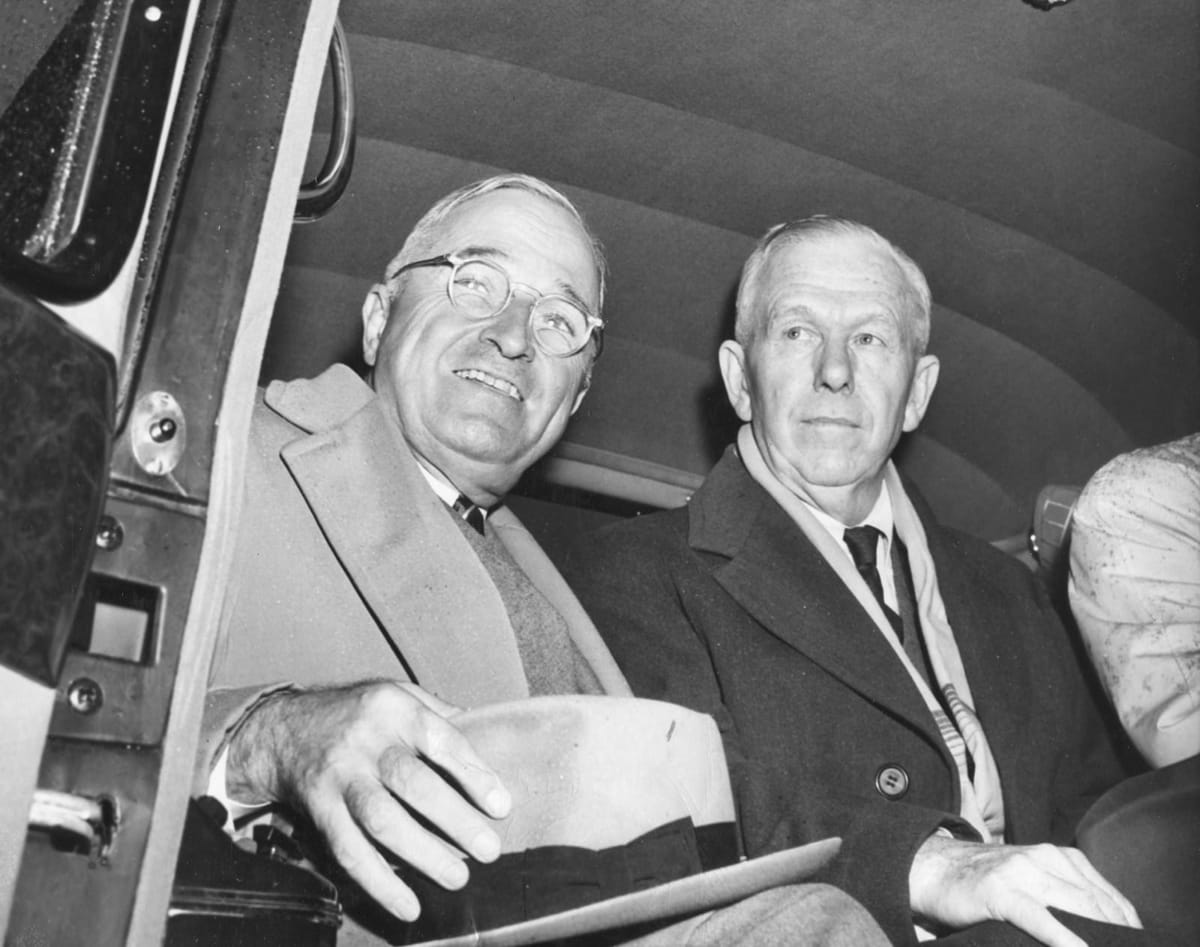A Moscow leader aggressively expanding. Conflict between Jews and Palestinians. An unpopular Democratic president in the United States suffering a polling slump one year before the election. Sound familiar? This, in fact, was the situation in 1947.
A year later, Harry Truman hadn’t solved these international problems, which of course fester to this day. But he had settled on clear policies. He had also won re-election, fostering in the process a bipartisan coalition that would endure for decades. Small wonder that Joe Biden is keen to talk up the parallels between then and now.
How did Truman do it? He began with obvious strengths. With so much of Europe and Asia still devastated by the Second World War, the United States was in a pre-eminent economic position. Other players, from London to Canberra, had not only become accustomed to working with Americans during the war, but were also desperate to follow Washington’s continued lead. Truman, although inexperienced, surrounded himself with an impressive team, most notably George Marshall, his secretary of state in 1947 and 1948 and an almost universally respected bipartisan general.
Yet beyond Washington’s corridors of power, most Americans were not enthusiastic about assuming the leadership role that Truman and Marshall wanted the United States to adopt. No one forgot the decision to reject the Versailles Treaty and membership in the League of Nations after the last war. In 1946, demobilisation and domestic reconstruction were the political priorities. That year, the Republican Party exploited this mood to win control of Congress, promising the country a smaller state and lower taxes. Some of the new Republican intake – including a young Richard Nixon – were also hyper-partisans, prepared to conflate liberalism with communism at the start of a witch-hunt that Joe McCarthy would spearhead a few years later.
Truman’s problem in 1947 was that he needed this Republican-controlled Congress to appropriate money for many of the foreign policy programs he had in mind, including most notably the Marshall Plan. Having lost the last four presidential elections, Republicans had little incentive to help the unpopular Democrat in the White House. Nor were they keen to spend money on foreigners, especially when their backers in big business told them that such a move would be inflationary.

Yet the Republican Party was a place where hierarchy mattered. Its senior figures, led by Senator Arthur Vandenberg, had been convinced by the war that the United States could not retreat from global leadership. They agreed to support Truman’s policies, if Truman gave them political cover with a speech that “scared the hell out of America”.
Although there were obvious perils in the president exaggerating the danger, the news agenda appeared to support the thrust of Truman’s rhetoric. Moscow, in particular, seemed bent on expansion. Its takeover of Czechoslovakia in the spring of 1948 proved particularly powerful in mobilising Republicans during the final push to approve the Marshall Plan.
Among those voting in favour was Nixon. In 1948, the young congressman acted in defiance of the main political supporters in his home district. Within a few years, he used this vote to cultivate the image of a responsible internationalist, who could be trusted with power at the national level.
In the spring of 1948, Truman also recognised the new state of Israel. It was a decision that generated much controversy inside the administration – Marshall even threatened to resign – for officials wanted to avoid alienating the Arab world, given the obvious strategic importance of oil and the Suez Canal. Truman, however, was convinced that supporting the creation of the state of Israel was the right thing to do, a homeland for the Jews being vital, in his view, in the wake of the Holocaust. Nor was Truman blind to the political advantages that would accrue, given the power of the Jewish-American vote in key swing states.
Truman based his re-election campaign in 1948 on concrete foreign policy achievements. Despite the crucial support Republicans had given him, he showed them little gratitude. On the stump, he railed against the “do-nothing” Congress, even though it had only recently passed the Marshall Plan.
Three-quarters of a century later, Biden will have a far greater scope to campaign against a Congress that has literally done nothing other than wrangle over its internal leadership while conflict rages in Ukraine and war erupted in Gaza. Whether he can convince these legislators to act in the coming months – and whether he can translate this political dynamic into votes next November – remain to be seen. But as Truman showed, even presidents with poor polling numbers have the power to seize control of the agenda, to lead, and to win.

